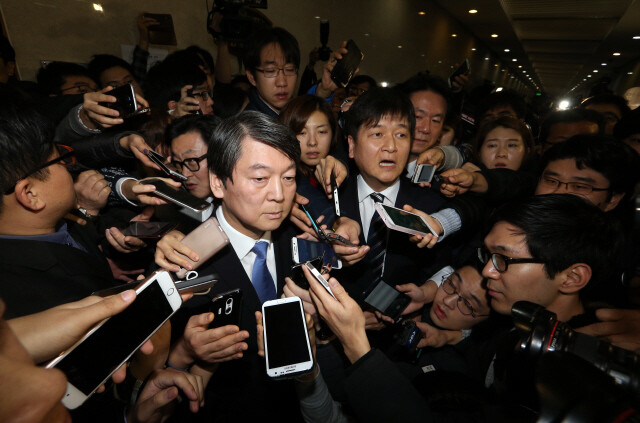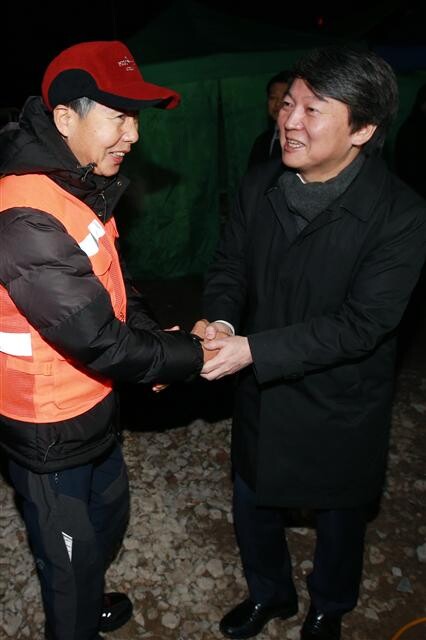hankyoreh
Links to other country sites 다른 나라 사이트 링크
Ahn Cheol-soo’s defection dividing the ruling party and the opposition

Ahn Cheol-soo’s defection from the opposition New Politics Alliance for Democracy (NPAD) is having an unintended consequence: Instead of just triggering the expected divisions in the opposition, it appears to be dividing the ruling Saenuri Party (NFP) as well.
Many are now watching to see if the lawmaker and software mogul’s defection will usher in the arrival of a new “third way” moderate party to challenge the deeply rooted two-party political terrain.
An opinion poll by the Hankyoreh asked respondents which party’s candidate they would support if the National Assembly elections were held the next day. The Saenuri received 26.6% of the vote to the NPAD’s 26.5%, while “a new party formed by Ahn Cheol-soo” was chosen by 16.4%.
Another survey by the polling organization Real Meter similarly showed Ahn’s new party with support from 16.5% of respondents to 35.2% for Saenuri and 28.0% for the NPAD. The findings were echoed in another survey by the Joongang Ilbo newspaper.

While direct comparison is difficult, support for Ahn’s party appears to have more than doubled from the seven to eight percent range where it had previously hovered. In contrast, the Saenuri Party, which had enjoyed support ratings in the 40-50% range for over two years, was seen dropping below 40%. An interpretation tying Ahn’s growing support with the Saenuri’s shrinking presence is looking more and more reasonable. Indeed, a recent survey by the Saenuri Youido Institute predicted Saenuri support plunging by over ten percentage points if Ahn does come out with a new party.
“In the past, there has been some splintering within the Saenuri Party, but that’s been covered up by the opposition’s disorder and incompetence,” said Han Kwi-young, head of the social studies center for the Hankyoreh Economic & Society Research Institute. “It appears that Ahn Cheol-soo’s defection is now bringing the divisions to the surface.”
“We need to examine more closely to see if this ‘third way’ - opposed to the ruling party, but not associated with the current opposition - has gotten stronger than it was in the past,” Han advised.
One polling expert, speaking on condition of anonymity, noted that signs of declining unity and loyalty among traditional Saenuri supporters had been detected since the Park Geun-hye administration pushed through a plan for state issuance of Korean high school history textbooks.
“But none of us predicted that it would be Ahn Cheol-soo’s defection that would bring this loosening to light,” the expert added.
“There’s a possibility that people from the Busan/South Gyeongsang regions and highly educated middle class voters have been throwing their support behind Ahn’s new party,” the expert said.
Some remained skeptical on Ahn’s chances of getting a serious third party off the ground.
“Whenever a new party appears, it’s natural for ruling party supporters to flock to it out of dissatisfaction with the current parties,” said Korea University professor Jeong Han-wool.
“The attitude of voters toward a party only really becomes clear once the party has established an identity, a course, a name, and members,” Jeong added, suggesting caution in reading too much into the support numbers.
Han Kwi-young agreed that Ahn’s competitiveness as a political figure “has diminished a lot from when he ran as a presidential candidate in 2012 or before he merged with the Democratic Party in 2014.”
“There’s going to be a period of adjustment going ahead,” Han predicted.
Indeed, past parties of similar leanings that were established by lawmakers such as Chung Mong-joon, Rhee In-je, and Park Chan-jong all enjoyed high support numbers early on, only to see the bubble burst soon after. Ahn himself joined forces with the Democratic Party after previously announcing plans for a part for “new politics” in 2013.
“If the ‘Ahn phenomenon’ keeps up, the Saenuri Party could try to draw back moderates by distancing itself from Park Geun-hye,” predicted one expert, speaking on condition of anonymity.
“And while the conservative media are focused right now on building Ahn Cheol-soo up as a way of feeding divisions in the opposition, once they decide the ruling party’s interests are jeopardized you can expect them to start attacking him immediately,” the expert added.
“It’s still too soon to rush into any judgments about how successful Ahn’s party will be,” the expert concluded.
By Kim Eui-kyum, senior staff writer
Please direct questions or comments to [english@hani.co.kr]

Editorial・opinion
![[Column] Has Korea, too, crossed the Rubicon on China? [Column] Has Korea, too, crossed the Rubicon on China?](https://flexible.img.hani.co.kr/flexible/normal/500/300/imgdb/original/2024/0419/9317135153409185.jpg) [Column] Has Korea, too, crossed the Rubicon on China?
[Column] Has Korea, too, crossed the Rubicon on China?![[Correspondent’s column] In Japan’s alliance with US, echoes of its past alliances with UK [Correspondent’s column] In Japan’s alliance with US, echoes of its past alliances with UK](https://flexible.img.hani.co.kr/flexible/normal/500/300/imgdb/original/2024/0419/2317135166563519.jpg) [Correspondent’s column] In Japan’s alliance with US, echoes of its past alliances with UK
[Correspondent’s column] In Japan’s alliance with US, echoes of its past alliances with UK- [Editorial] Does Yoon think the Korean public is wrong?
- [Editorial] As it bolsters its alliance with US, Japan must be accountable for past
- [Guest essay] Amending the Constitution is Yoon’s key to leaving office in public’s good graces
- [Editorial] 10 years on, lessons of Sewol tragedy must never be forgotten
- [Column] A death blow to Korea’s prosecutor politics
- [Correspondent’s column] The US and the end of Japanese pacifism
- [Guest essay] How Korea turned its trainee doctors into monsters
- [Guest essay] As someone who helped forge Seoul-Moscow ties, their status today troubles me
Most viewed articles
- 1[Column] The clock is ticking for Korea’s first lady
- 2After 2 months of delayed, denied medical care, Koreans worry worst may be yet to come
- 3[Column] Has Korea, too, crossed the Rubicon on China?
- 4[Editorial] When the choice is kids or career, Korea will never overcome birth rate woes
- 5[Correspondent’s column] In Japan’s alliance with US, echoes of its past alliances with UK
- 6Hong Se-hwa, voice for tolerance whose memoir of exile touched a chord, dies at 76
- 7US exploring options for monitoring N. Korean sanctions beyond UN, says envoy
- 8Samsung barricades office as unionized workers strike for better conditions
- 9US overtakes China as Korea’s top export market, prompting trade sanction jitters
- 10[Photo] Smile ambassador, you’re on camera